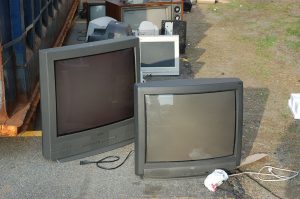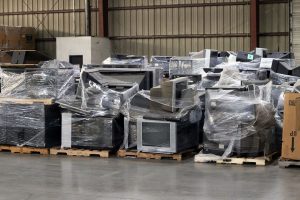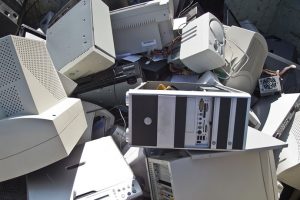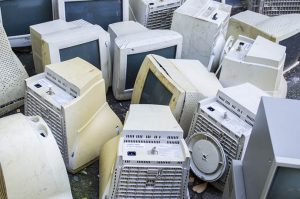 A TV collection debacle in one Pennsylvania township illustrates the problems the state electronics recycling program continues to face.
A TV collection debacle in one Pennsylvania township illustrates the problems the state electronics recycling program continues to face.

 A TV collection debacle in one Pennsylvania township illustrates the problems the state electronics recycling program continues to face.
A TV collection debacle in one Pennsylvania township illustrates the problems the state electronics recycling program continues to face.

Credit: Eric Dykstra
Changes in the end-of-life stream are prompting the oldest state electronics recycling program in the country to rethink its processor payment system.
 E-scrap collections in Washington state have been decreasing for the past four years, both in terms of total and per-capita weights.
E-scrap collections in Washington state have been decreasing for the past four years, both in terms of total and per-capita weights.
 A Canadian province has received a positive reception for its electronics extended producer responsibility program, but collection volumes are trending lower than expected. Continue Reading
A Canadian province has received a positive reception for its electronics extended producer responsibility program, but collection volumes are trending lower than expected. Continue Reading
 New York regulators have come up with a number of recommendations to improve the state’s e-scrap recycling program, according to a report recently delivered to the state’s governor.
New York regulators have come up with a number of recommendations to improve the state’s e-scrap recycling program, according to a report recently delivered to the state’s governor.
 Saskatchewan will expand the list of device types it accepts for electronics recycling, including one absent from most North American programs: microwave ovens.
Saskatchewan will expand the list of device types it accepts for electronics recycling, including one absent from most North American programs: microwave ovens.
 Regulators in a Midwest state say the fundamental elements of its producer responsibility law remain sound, but industry-wide challenges are straining the program. In an annual report, Wisconsin state officials quantify these challenges and offer some potential fixes.
Regulators in a Midwest state say the fundamental elements of its producer responsibility law remain sound, but industry-wide challenges are straining the program. In an annual report, Wisconsin state officials quantify these challenges and offer some potential fixes.
 Draft legislation would make Massachusetts the 26th state with a regulated e-scrap program.
Draft legislation would make Massachusetts the 26th state with a regulated e-scrap program.

The latest Canadian province to launch an industry-managed electronics recycling program is finding healthy use of its drop-off locations.
